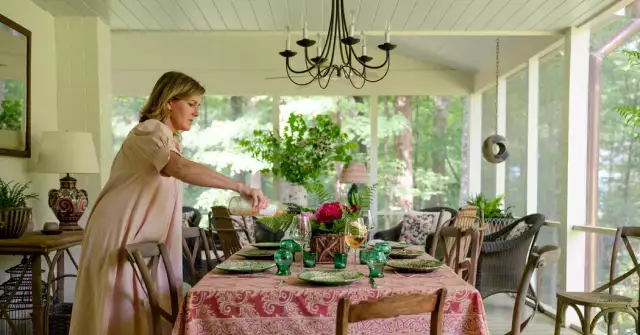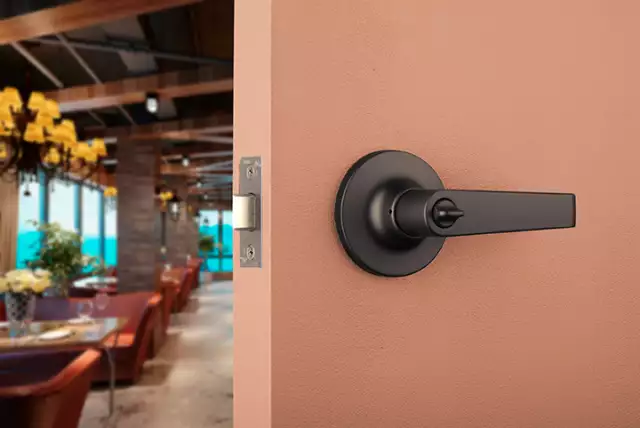Keith Meacham brings her oh-this-old-thing elegance to a Southern retreat
Keith Meacham brings her oh-this-old-thing elegance to a Southern retreat
This article is part of our latest Design special section, about spaces inspired by nature.
SEWANEE, Tenn. — Keith Meacham moves eagerly to greet a visitor, accompanied by two ecstatic spaniels. In a loose pink cotton shift that patrols the border between chic and ease, she leads her guest into a screened porch filled with rattan chairs and flowers foraged from the woods around her home.
Her toenails are painted blue.
She is a paragon of insouciant, oh-this-old-thing elegance, and so is the weekend retreat she shares with her husband, the Pulitzer Prize-winning historian Jon Meacham, 53, and their three children.
Wrapped in a mantle of forest on the campus of Sewanee: the University of the South, the neo-Georgian house has jewel-toned interiors, William Morris wallpaper, moody photographs of pears and, here and there, a bird’s nest. To the charmed visitor, it appears to be a love letter to British country estates of long ago and the nature-obsessed eccentrics who ambled through them.
Ms. Meacham, 52, is the co-founder of an online design business called Reed Smythe & Company that sells the kinds of artifacts — sometimes the very things — that decorate the home. She has filled a comical ceramic vase that has human features with scavenged mountain laurel, honeysuckle, ferns and maple seedlings and laid a table with stemless goblets and speckled dishes. The vase is by the Los Angeles artist Matthias Vriens-McGrath and is sold at her shop; the plates are from the Parisian design boutique La Tuile à Loup; and the handblown glassware is modeled on 18th-century wineglasses.
“I love mixing these green glasses with an unexpected color tablecloth,” she said about the pink-and-yellow paisley fabric, a vintage Indian textile that complements the peonies, hellebore and rhododendron arranged in the centerpiece. “But it looks great.”
In November, Reed Smythe opened its first brick-and-mortar boutique 90 minutes away, in Nashville, where the Meacham family principally lives. Sewanee, with its cool, mountain air and bursts of birdsong, is for weekends and holidays.
How the Meachams got there is quite a story. Ms. Meacham was a high school senior from the Mississippi Delta who had been offered a scholarship to Sewanee, as the school is familiarly known. Mr. Meacham, a native of nearby Chattanooga, was a freshman there.
In Mr. Meacham’s version of events, as narrated by his wife, the admissions dean suggested that he talk to this “smart girl” when she visited the campus and try to persuade her to attend. But when Mr. Meacham went to a reception to meet her and saw a pretty girl sitting in the corner, he thought he would hang out with her while he waited for the smart girl to show up. Eventually, he realized they were the same person.
That is not the punchline. This is the punchline: After her visit, Ms. Meacham sent Mr. Meacham a gracious thank you note letting him know that she had decided to go to the University of Virginia.
The couple corresponded regularly for the next several years but seldom saw each other. Only after they both relocated to Washington, D.C., did they form a romantic attachment.
They later settled in New York City, where Ms. Meacham worked as an educator and eventually joined the team that founded Homer, a technology company that produces educational software. Mr. Meacham made his name in journalism and rose to the editorship of Newsweek magazine.
The couple enjoyed living on the Upper East Side but missed the lush greenery of their natal South. Both were able to take off the month of July, so they found their way back to Sewanee. (They wanted to return home, but not to their actual hometowns.)
For a few years, they rented a cottage in nearby Monteagle. Then, two years after the birth of their second child, in 2006, they bought this house, a sober brick building dating from the late 1920s or early 1930s that had been owned by the headmaster of the Sewanee Military Academy.
In 2012, they decided to relocate full time to Tennessee. Newsweek had been sold by its owner at the time, the Washington Post Company, and was on the brink of moving exclusively online. Mr. Meacham wanted to spend more time writing his presidential biographies. (His next, “And There Was Light: Abraham Lincoln and the American Struggle,” is due out from Penguin Random House in October.) Because the couple needed access to an airport and craved some semblance of urbanism, they settled in Nashville, using the Sewanee house for getaways.
Their first major gesture when they acquired the property was to double its size by adding a two-story screened porch. The addition sinks the family into cool, verdant depths downstairs and turns into a pleasantly percussive instrument upstairs when rain hits the roof.
“All destinations lead to the porch in the summer,” Ms. Meacham said. “We live out there, entertain there, read out there, eat every meal.”
Ms. Meacham handles most of the décor decisions, though she looks for advice to Bill Brockschmidt and Courtney Coleman, interior designers with offices in New York and New Orleans.
“She has a bundle of ideas and she likes to bounce ideas off us,” Mr. Brockschmidt said. He noted that Ms. Meacham was not intimidated by objects and fabrics that others might find too formal. She is not concerned about wear or the damage children and dogs do, which lends a feeling of comfort rather than stiffness to her surroundings.
“When you’re in her homes, you’re just at ease immediately,” he said.
Recently, the designers consulted with her on painting the dining room in a Farrow & Ball red called Radicchio. In this room, one’s eye is drawn to a painting of a middle-aged woman with bobbed hair and a striped scarf — the mother of Herbert Wentz, a Sewanee religion professor who took the young Mr. Meacham under his wing and bequeathed him the portrait many years later.
In the living room, Farrow & Ball’s Sap Green is a backdrop for bird-themed artwork and birds’ nests collected by Ms. Meacham. (“I’m sure there are mites all over the place,” she said.) The seating is unpretentious and fat and upholstered in textiles by Pierre Frey and Lisa Fine, among other designers. Nubby candles hand-cast from cedar branches are clustered near a wall of books.
“They are ephemeral works of art that are as beautiful in a pair of sterling silver candlesticks on a decadent holiday table as they are on a casual side table in a cozy study,” states the copy on the Reed Smythe website, where the candles are sold.
Reed Smythe was the inspiration of Ms. Meacham’s best friend, Julia Evans Reed, a New Orleans-based journalist and author of books about design, entertaining and Southern culture and politics. She, too, had grown up on the Mississippi Delta and made her way to New York, where she and Ms. Meacham formed a bond.
The two women shared a love of scouting for vintage finds and commissioning decorative objects from artisans, particularly in the South. Together they developed the business as a digital platform, using their family names. (Ms. Meacham’s — Smythe — rhymes more or less with “blithe.”)
Shortly before Reed Smythe was founded, in the fall of 2018, Ms. Reed was diagnosed with cancer. She died in August 2020. In her obituary for Garden & Gun magazine, where she had been a columnist, Mr. Meacham wrote: “If we’d tried to invent a character like Julia, nobody would have believed it. She was a tsunami of talent, charm and energy.”
Today, the new boutique is a scented pocket of eccentricity in a gentrifying neighborhood. It casts a consumerist spell that makes you long more than you ever thought possible for place-card holders shaped like squirrels sitting on their haunches, or lollipop-colored vessels that were originally designed to rinse wineglasses. (The wine rinsers are based on 18th-century versions collected by Ms. Meacham and Ms. Reed.)
Down the street, a sushi restaurant called Punk Wok plays “Rock Lobster” by the B-52s and flaunts a wall mural with a quotation by Johnny Rotten of the Sex Pistols. The quotation says: “Don’t accept the old order. Get rid of it.”
Recalling events she planned with Ms. Reed when they were sisters in entertaining in New York, Ms. Meacham said: “We were talking about a lot more than what we were going to serve at the party, and who was going to come. It was really about how you forge new friendships and how you create a space that’s welcoming.”





